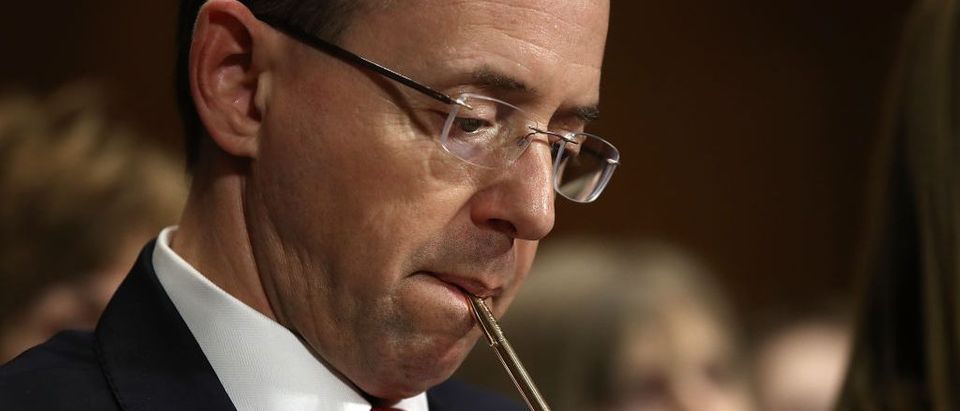In Congressional testimony on Tuesday, Deputy Attorney General Rod Rosenstein proved that he knows little about the science surrounding medical marijuana.
In response to a question from Washington Rep. Derek Kilmer, Rosenstein repeated the canard that the plant lacks any accepted therapeutic utility. “Scientists have found no accepted medical use for it,” he opined.
In fact, scientists with expertise on the subject say just the opposite.
In January, scholars at the National Academy of Sciences, Engineering, and Medicine published a comprehensive review of over 10,000 scientific abstracts specific to cannabis and health. They determined that there exists “conclusive evidence” that cannabis and its constituents are effective for the treatment of chronic pain, multiple sclerosis, and other diseases.
To date, 30 US states authorize the physician-recommended use of marijuana or marijuana-infused products by statute. An additional sixteen states permit patients to access products containing cannabidiol, a specific chemical compound available in the cannabis plant that is known to possess anti-psychotic and anti-epileptic effects. Just last month, placebo-controlled, randomized clinical trial data published in the prestigious New England Journal of Medicine reported that CBD administration significantly reduces seizure frequency in children with an otherwise drug-resistant form of the disease — a finding that led the study’s lead author to pronounce: “Cannabis is approved in 20 countries for spasms in multiple sclerosis so to say there’s no evidence of efficacy is simply untrue. … They have to de-schedule this drug. It’s just not fair to the research and clinical communities, or to the patients. It’s medieval.”
Unlike modern pharmaceuticals, cannabis possesses an extensive history of human use dating back thousands of years, thus providing society with ample empirical evidence as to its safety and efficacy compared to conventional medications. Moreover, cannabis and its compounds are among some of the more studied biologically active substances of modern times. A search on PubMed using the term ‘marijuana’ yields more than 25,000 scientific papers referencing the plant and/or its components. This totality of peer-reviewed research is far greater than that which exists for most other controlled substances, particularly pharmaceuticals. For example, a similar search for ‘hydrocodone’ (a commonly prescribed opioid pain medication) yields fewer than 1,000 citations in the peer-reviewed literature, while a search for ‘adderall’ (a prescription amphetamine often provided to young people to treat ADHD) reveals only 201 papers.
Moreover, while cannabis’ Schedule I classification under federal law makes clinical research far more onerous than it should be, it does not preclude it all together. FDA-approved placebo controlled studies exist assessing the safety and efficacy of cannabis or its components, and a recent literature review identifies some 140 controlled trials involving some 8,000 patient participants. (By comparison, the FDA typically approved new medications on the basis of one or two pivotal trials.) A review of several FDA-sponsored medical marijuana trials concludes, “Based on evidence currently available the Schedule I classification is not tenable; it is not accurate that cannabis has no medical value, or that information on safety is lacking.”
Contrary to Deputy AG Rosenstein’s contention, scientists know enough about marijuana’s relative safety and efficacy, as well as the failures of marijuana prohibition, to allow adults the option to consume it and to allow states the autonomy to regulate it as best they see fit. If the Department of Justice isn’t willing to acknowledge this reality then it is incumbent that members of Congress do so by amending federal laws in a manner that comports with majority public opinion and the plant’s rapidly changing legal and cultural status.
Paul Armentano is the Deputy Director of the National Organization for the Reform of Marijuana Laws (NORML) and is the co-author of the book Marijuana Is Safer: So Why Are We Driving People to Drink? (Chelsea Green Publishing, 2013).


